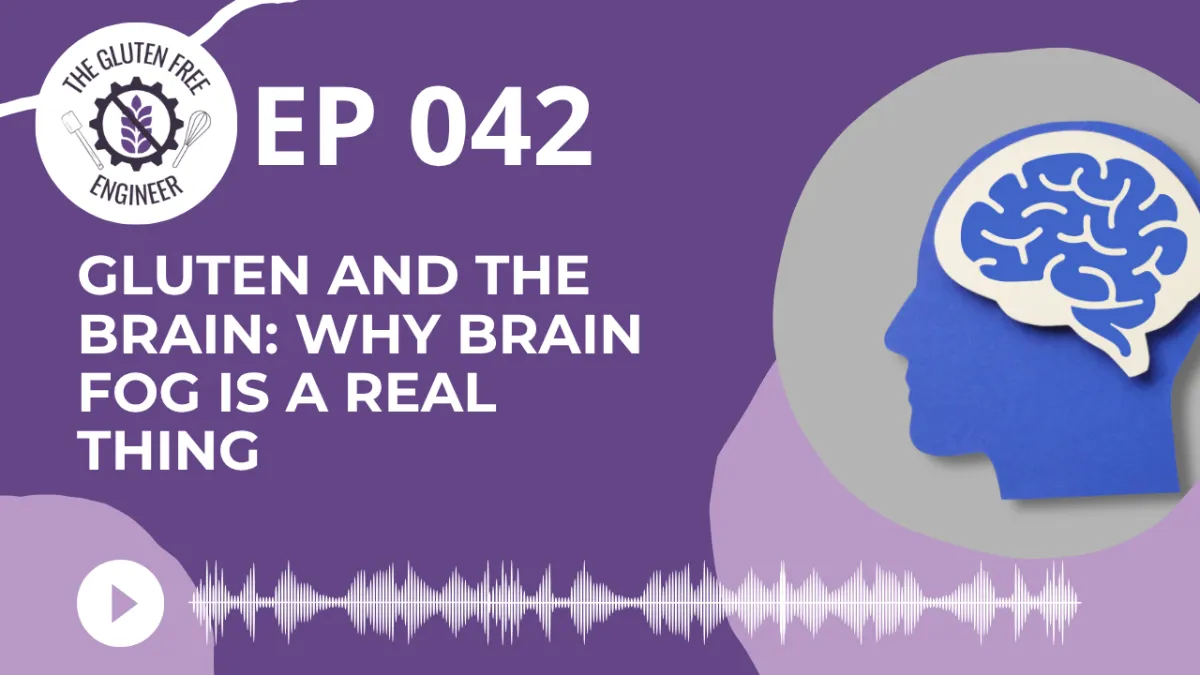
#42: Gluten and the Brain: Why Brain Fog Is a Real Thing
Have you ever felt foggy, forgetful, or like your brain just isn’t firing the way it used to — especially after being glutened? You’re not imagining it.
There’s growing research showing how gluten can affect the brain and nervous system, even in people without obvious stomach issues. In today’s episode, we’ll unpack what ‘gluten brain fog’ really is, why it happens, and what you can do to clear your head and feel like yourself again.
And stick around until the end, because I’ll share the one daily habit that’s made the biggest difference for my own mental clarity.
Let's Recap: Why Brain Fog Is a Real Thing
Brain fog is a slippery feeling that’s hard to name and even harder to solve, especially when it appears after a meal you thought was safe. Listeners often describe losing words mid-sentence, walking into rooms with no clue why, or a gray film over emotions and focus. The link to gluten can be confusing because not everyone gets stomach symptoms; the brain takes the hit instead. Research points to immune activation that reaches beyond the gut, stirring inflammation in the nervous system and making ordinary tasks feel strangely heavy. When this fog settles in, your day shrinks: thinking feels slow, decisions feel risky, and emotions feel blunted or jumpy. Recognizing the pattern is the first step to getting your clarity back.
Why It Happens
The “why” matters because precision brings relief. Gluten-related inflammation can ramp up immune cells that affect the brain, while long-term gut issues may block absorption of critical nutrients like B12, iron, folate, and vitamin D. Low levels in any of these can quietly erode memory, focus, and mood, even when digestion seems fine. Emerging evidence suggests antibodies triggered by gluten may cross-react with neural tissue, and inflammation can loosen the blood-brain barrier, letting troublemakers into the system. When that gate opens, fatigue and confusion follow. Understanding these mechanisms reframes brain fog as physiology, not personal failure, and makes medical partnership essential.
Recognizing Real-Life Patterns
Real life rarely looks like a textbook. For many, fog spikes after accidental gluten exposure, arriving as word loss, mental detachment, or sudden irritability. Parents notice it in kids too: a flip from calm to combative that later matches digestive fallout. Stress can mimic these symptoms, which is why keeping a timeline matters. Track what you ate, how you slept, and the exact moment the fog rolled in. Over time, patterns emerge: a mislabeled sauce, cross-contact at a friend’s kitchen, or even certified gluten-free oats that still trigger symptoms for some due to similar proteins. When the trend line points to a trigger, you can finally act with confidence.
Habits That Support Clarity
Clarity improves when you combine strict gluten control with habits that feed the brain. Start with a tight gluten-free routine and avoid “small cheats,” which can provoke brain symptoms even if your stomach feels fine. Support the foundations: prioritize sleep to consolidate memory, hydrate early to counter overnight dehydration, and check labs for B12, iron, folate, and vitamin D with your clinician. Ask about optimal ranges, not just normal minimums.
Focus on diet quality. Whole, single-ingredient foods tend to reduce inflammatory load and steady energy. Build meals with clean protein, a rainbow of plants, and omega-3 sources like salmon, sardines, chia, or walnuts for a calmer baseline.
A Simple Daily Habit
One daily habit stands out for speed and simplicity: protein and hydration before caffeine. A small serving—like a couple of sausage links or eggs—paired with water can blunt morning brain fog by stabilizing blood sugar and fueling the brain before stimulants. Caffeine lands better when the system is primed, not parched. If breakfast is hard, keep it tiny but consistent. Over a few weeks, many notice fewer crashes and more even focus through mid-morning. It’s a modest shift with outsized effects, especially when your body is still healing from past exposures. Layer in gentle movement and sunlight when you can to reinforce circadian rhythm and mood.
Staying the Course
Keep your detective mindset engaged. Log fog intensity alongside meals, stressors, and sleep to catch hidden patterns like cross-contact at restaurants, shared toasters, or oats that don’t love you back. Treat the log as data, not judgment. If symptoms persist, talk with your clinician about further testing or referrals. Brain fog is not a character flaw; it’s a signal. With targeted nutrition, strict gluten boundaries, and a few smart routines, you can feel sharp more days than not. Relief is realistic, and clarity can be rebuilt—one choice, one morning, one meal at a time.
